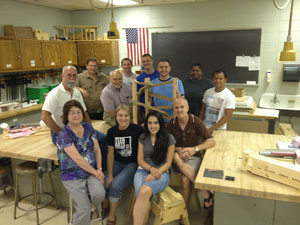Creating a National Model for High School STEM Education
Proposed changes to New Jersey’s science education standards could soon make technology and engineering required subject matter for high school students. The problem, says Chris Anderson ’02, adjunct professor of technological studies, is that schools have no access to model curricula for that content, and many administrators are unprepared to assess student and teacher performance […]

Chris Anderson ’02 (in light blue shirt) is pictured with some of the educators who participated in the Engineering by Design training workshops held this summer.

Proposed changes to New Jersey’s science education standards could soon make technology and engineering required subject matter for high school students. The problem, says Chris Anderson ’02, adjunct professor of technological studies, is that schools have no access to model curricula for that content, and many administrators are unprepared to assess student and teacher performance in technology and engineering classrooms, where nontraditional, project-based learning methods often achieve the best results.
But an initiative that Anderson is directing for TCNJ’s Center for Excellence in STEM Education could remedy these problems. The center’s Engineering by Design program is a three-year, K–12 integrative effort that provides schools with access to a standards-based, comprehensive national curriculum and assessment model for STEM (science, technology, engineering, and mathematics) education, as well as ongoing professional development programs for educators.
TCNJ’s center purchased the curriculum, which was developed by the International Technology and Engineering Educators Association, and provides it free of charge to participating schools—with the caveat that the schools implement standardized assessment pieces and require participating teachers to attend ongoing training. Those assessments provide the center’s educators with data on student achievement in technology and engineering literacy, as well as survey data on student attitudes toward STEM careers, STEM content, and its importance in their education, said Anderson.
“As much as we don’t like standardized tests, we need them to get data. Data is the only way to inform policy and make big reforms happen in education,” said Anderson.
Informal evidence suggests that students enrolled in technology education classes perform better in math and science. Anderson said this undertaking by TCNJ’s center marks the first time anyone in New Jersey has collected quantitative data to examine if that is the case.
Currently, 50 educators are involved in the program, which is the only one of its kind in the state, Anderson said. That puts TCNJ’s center in a unique position if and when new standards are implemented that make the study of technology and engineering requirements for all New Jersey high school students.
“We’ll have a proven curriculum that we’re already using, a model for professional development, and a system for collecting student achievement data,” said Anderson. “That gives us a chance to create a national model other states can follow.”
Posted on September 19, 2012

